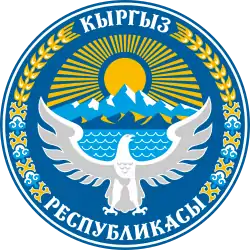Supreme Council (Kyrgyzstan)
The Supreme Council (Kyrgyz: Жогорку Кеңеш, Joğorku Keŋeş, جوعورقۇ كەڭەش, [dʒoʁorqu keŋeʃ]; Russian: Верховный Совет, Verkhovnyy Sovet) is the unicameral Parliament of the Kyrgyz Republic. It was known as the Supreme Soviet of the Kirghiz Soviet Socialist Republic until 1991.
Supreme Council Жогорку Кеңеш Joğorqu Keŋeş Верховный Совет | |
|---|---|
| 7th Supreme Council | |
 | |
| Type | |
| Type | |
| History | |
| Founded |
|
| Leadership | |
Speaker | |
Prime Minister | |
| Structure | |
| Seats | 120 |
 | |
Political groups | Social Democratic Party (38)
Respublika-Ata Jurt (28) Kyrgyzstan Party (18) Bir Bol (12) Ata-Meken (11) Onuguu–Progress (10) Independents (3) |
Length of term | 5 years |
| Elections | |
| Party-list proportional representation | |
Last election | 4 October 2020 |
| Meeting place | |
.jpg.webp) | |
| Jogorku Kenesh Building, Bishkek | |
| Website | |
| www | |
 |
|---|
| This article is part of a series on the politics and government of Kyrgyzstan |
|
|
| Constitution |
The parliament has 120 seats with members elected for a five-year term by party-list proportional voting.
History
During Soviet rule, it was known as the Supreme Soviet of the Kirghiz SSR.
From 1991, when Kyrgyzstan gained independence from the Soviet Union, until October 2007, when the Constitution was changed in a referendum, the Supreme Council consisted of the Legislative Assembly (Мыйзам Чыгаруу Жыйыны, Mıyzam Çıgaruu Jıyını, the upper house) and the Assembly of People's Representatives (Ел Окулдор Жыйыны, El Oquldor Jıyını, lower house) with 60 and 45 members, respectively. The members of both houses were elected to five-year terms. In the Assembly of People's Representatives all 45 members were elected in single-seat constituencies; in the Legislative Assembly 45 members were elected in single-seat constituencies and 15 were elected through party lists.
Since October 2007, the Supreme Council is a unicameral legislature. Originally it consisted of 90 members, however when in 2010 President Kurmanbek Bakiyev was ousted after riots, a new Constitution was adopted, that increased the number of members to 120. Parties are limited to 65 seats in order to prevent power concentration.
Electoral system
The 120 seats in the Supreme Council are elected by proportional representation in a single nationwide constituency. To win seats, parties must pass a national electoral threshold of 9% - up from 7 % before 2017[1] -, and receive at least 0.7% of the vote in each of the seven regions.[2] No party is allowed to hold more than 65 seats.[3] Party lists are required to have at least 30% of the candidates from each gender, and every fourth candidate had to be of a different gender. Each list is also required to have at least 15% of the candidates being from ethnic minorities and 15% of under 35 years old, as well as at least two candidates with disabilities.[3][4]
Speakers
The first legislature of Kyrgyzstan was Supreme Soviet until 1994.
Bicameral legislature was established in 1995, and replaced with unicameral legislature, Supreme Council, in 2005.[5]
Chairmen of the Assembly of People's Representatives of Kyrgyzstan was the presiding officer of one of the two chambers of the Supreme Council.[6]
| Name | Took office | Left office |
|---|---|---|
| Almanbet Matubraimov | 28 March 1995 | 26 November 1997 |
| Abdıganı Erkebayev | 26 November 1997 | April 2000 |
| Altay Borubayev | 25 April 2000 | 24 March 2005 |
| Muratbek Mukaşev | 24 March 2005 | 25 March 2005 |
The Chairman of the Legislative Assembly of Kyrgyzstan was the presiding officer of one of the two chambers of the Supreme Council.[7]
| Name | Took office | Left office |
|---|---|---|
| Mukar Cholponbayev | 29 March 1995 | 15 November 1996 |
| Usup Mukambayev | 15 November 1996 | 14 April 2000 |
| Abdıganı Erkebayev | 15 April 2000 | 24 March 2005 |
| İşenbay Kadırbekov | 24 March 2005 | 25 March 2005 |
Chairmen of the Supreme Council since 2005.[8] Annual compensation of the chairman is 975 000 soms.
| Name | Took office | Left office | Notes |
|---|---|---|---|
| Omurbek Tekebaev | 27 March 2005 | 27 February 2006 | [9][10] |
| Marat Sultanov | 2 March 2006 | 22 October 2007 | [11][12] |
| Adahan Madumarov | 24 December 2007 | 29 May 2008 | [13][14] |
| Aytibay Tagaev | 29 May 2008 | 17 December 2009 | [15] |
| Zaynidin Kurmanov | 24 December 2009 | 6 June 2010 | [16] |
| Ahmatbek Keldibekov | 17 December 2010 | 14 December 2011 | [17][18] |
| Asılbek Jeenbekov | 21 December 2011 | 13 April 2016 | [19][20] |
| Chynybaĭ Tursunbekov | 27 April 2016 | 25 October 2017 | [21][22] |
| Dastan Jumabekov | 25 October 2017 | 6 October 2020 | [23] |
| Myktybek Abdyldayev | 6 October 2020 | 10 October 2020 | |
| Kanatbek Isaev | 13 October 2020 | 4 November 2020 | |
| Talant Mamytov | 4 November 2020 | Incumbent |
Last elections
- 2020 Kyrgyz parliamentary election
- 2015 Kyrgyz parliamentary election
- 2010 Kyrgyz parliamentary election
- 2007 Kyrgyz parliamentary election
2005 parliamentary election
The 2005 Kyrgyz parliamentary elections were held in February and March 2005. More than 400 candidates ran for the new 75-member unicameral legislative assembly. There were two rounds of voting held on 27 February and 13 March. Six seats were won by opposition politicians. Most candidates were officially independent. International observers said the elections fell short of international standards for democratic elections in several important areas. Widespread protests over alleged rigging of the election by the government culminated in the Tulip Revolution on 24 March. Revolutionaries overthrew President Askar Akayev.
See also
- List of members of the Supreme Council (Kyrgyzstan), 2015–present
- List of Chairmen of the Supreme Soviet of the KSSR and the Supreme Council of Kyrgyzstan
- List of Chairmen of the Legislative Assembly of Kyrgyzstan
- List of Chairmen of the Assembly of People's Representatives of Kyrgyzstan
- Politics of Kyrgyzstan
- List of legislatures by country
References
- THE CONSTITUTIONAL LAW amended as of 23/04/2015
- Kyrgyz Republic: Election for Jorgorku Keneshg (Kyrgyz Supreme Council) IFES
- Electoral system IPU
- THE CONSTITUTIONAL LAW On Presidential and Jogorku Kenesh Elections in the Kyrgyz Republic
- https://iacis.ru/eng/parliaments/parlamenty_uchastniki/jogorku_kenesh_of_the_kyrgyz_republic
- "Archived copy". Archived from the original on 2010-02-09. Retrieved 2010-02-09.CS1 maint: archived copy as title (link)
- "Archived copy". Archived from the original on 2010-02-09. Retrieved 2010-02-09.CS1 maint: archived copy as title (link)
- "Archived copy". Archived from the original on 2010-02-09. Retrieved 2010-02-09.CS1 maint: archived copy as title (link)
- "Background on Ata Meken Party". Carnegie Endowment for International Peace. Retrieved 2017-12-17.
- ПОДОЛЬСКАЯ, Дарья (2017-10-25). "Как и почему уходили спикеры парламента Кыргызстана". 24.kg (in Russian). Retrieved 2017-12-17.
- "Kyrgyz Lawmakers Elect New Speaker". RadioFreeEurope/RadioLiberty. Retrieved 2017-12-17.
- "Does New Constitution Strengthen Democracy -- Or President?". RadioFreeEurope/RadioLiberty. Retrieved 2017-12-17.
- "Kyrgyzstan's Ruling Party Names Its Choice For Prime Minister". RadioFreeEurope/RadioLiberty. Retrieved 2017-12-17.
- ПОДОЛЬСКАЯ, Дарья (2017-10-25). "Как и почему уходили спикеры парламента Кыргызстана". 24.kg (in Russian). Retrieved 2017-12-17.
- "Айтибай Тагаев стал новым спикером киргизского парламента - ИА REGNUM". ИА REGNUM (in Russian). Retrieved 2017-12-17.
- ПОДОЛЬСКАЯ, Дарья (2017-10-25). "Как и почему уходили спикеры парламента Кыргызстана". 24.kg (in Russian). Retrieved 2017-12-17.
- ПОДОЛЬСКАЯ, Дарья (2017-10-25). "Как и почему уходили спикеры парламента Кыргызстана". 24.kg (in Russian). Retrieved 2017-12-17.
- "Ex-Speakers of Parliament of Kyrgyzstan". akipress.com. Retrieved 2017-12-17.
- ПОДОЛЬСКАЯ, Дарья (2017-10-25). "Как и почему уходили спикеры парламента Кыргызстана". 24.kg (in Russian). Retrieved 2017-12-17.
- "Asilbek Jeenbekov steps down as Parliament Speaker". akipress.com. Retrieved 2017-12-17.
- ПОДОЛЬСКАЯ, Дарья (2017-10-25). "Как и почему уходили спикеры парламента Кыргызстана". 24.kg (in Russian). Retrieved 2017-12-17.
- "Chynybai Tursunbekov steps down as Speaker of Parliament of Kyrgyzstan". akipress.com. Retrieved 2017-12-17.
- "Majority coalition backs candidacy of Dastan Jumabekov for Parliament Speaker". akipress.com. Retrieved 2017-12-17.